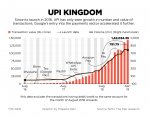PayPal CTO says in for the long haul in India, to back UPI soon
US payments company PayPal looks at India as a critical market to build local products working with the country’s domestic card system RuPay, and intends to support the Unified Payments Interface (UPI), the open platform that has revolutionised digital payments in the country.
“As a global company, India is a very critical market for us. It is very, very important and we think of it longterm,” PayPal chief technology officer Sri Shivananda told ET. “There’s a lot that we are doing in terms of working with the local ecosystem, including the government and the regulators.”
“We will continue to grow the products that we offer (in India) over a period of time. We’ve worked on RuPay integration. And over time, we plan on doing the UPI piece,” he added.
The National Payments Corporation of India built the UPI payments railroad. PayPal, founded by Elon Musk and Peter Theil, disrupted the US payments industry during the dotcom boom and was soon acquired by eBay, the auction listing company.
In 2015, it was spun off as a separate entity and is expected to cease processing card payments for the auction listing company by the end of this year. It has 305 million accounts globally, according to a regulatory disclosure.
The firm has thousands of users in India, largely individuals and small and medium enterprises who use the platform to receive payments for services rendered to customers globally. “We’ve been in India for a long time, but we were focused mostly on cross-border trade, helping micro, small and medium enterprises in India.
We do a significant large volume of Indian service providers, providing services to people outside. We are the (platform) for Indian diaspora sending money back to India. So, we’ve been in that business for a long time, almost a decade,” he said.
PayPal has not been late coming to the Indian digital payment ecosystem, using the UPI platform dominated by Google Pay, PhonePe and Paytm. UPI processed over 1.32 billion transactions in February, the highest in a month since it became operational in August 2016.
More users in India transact using a mobile app that has UPI connected to their bank accounts, rather than use debit or credit cards. “If you measure things based on this week or this quarter, that’s different. We think of ourselves as a long-term player. We’re here to make sure that Indian consumers have access to our services as well.
And we are making all the investments necessary to make sure we can sell them (here) as well…,” Sivananda said.
PayPal has its largest engineering team outside of the US in India, with centres in Bengaluru, Hyderabad and Chennai that work on global products with relevance in India. “They are continuously innovating across all the platforms. And this innovation is done in India, that actually supports the whole globe…,” he said.
PayPal CTO says in for the long haul in India, to back UPI soon
US payments company PayPal looks at India as a critical market to build local products working with the country’s domestic card system RuPay, and intends to support the Unified Payments Interface (UPI), the open platform that has revolutionised digital payments in the country.
“As a global company, India is a very critical market for us. It is very, very important and we think of it longterm,” PayPal chief technology officer Sri Shivananda told ET. “There’s a lot that we are doing in terms of working with the local ecosystem, including the government and the regulators.”
“We will continue to grow the products that we offer (in India) over a period of time. We’ve worked on RuPay integration. And over time, we plan on doing the UPI piece,” he added.
The National Payments Corporation of India built the UPI payments railroad. PayPal, founded by Elon Musk and Peter Theil, disrupted the US payments industry during the dotcom boom and was soon acquired by eBay, the auction listing company.
In 2015, it was spun off as a separate entity and is expected to cease processing card payments for the auction listing company by the end of this year. It has 305 million accounts globally, according to a regulatory disclosure.
The firm has thousands of users in India, largely individuals and small and medium enterprises who use the platform to receive payments for services rendered to customers globally. “We’ve been in India for a long time, but we were focused mostly on cross-border trade, helping micro, small and medium enterprises in India.
We do a significant large volume of Indian service providers, providing services to people outside. We are the (platform) for Indian diaspora sending money back to India. So, we’ve been in that business for a long time, almost a decade,” he said.
PayPal has not been late coming to the Indian digital payment ecosystem, using the UPI platform dominated by Google Pay, PhonePe and Paytm. UPI processed over 1.32 billion transactions in February, the highest in a month since it became operational in August 2016.
More users in India transact using a mobile app that has UPI connected to their bank accounts, rather than use debit or credit cards. “If you measure things based on this week or this quarter, that’s different. We think of ourselves as a long-term player. We’re here to make sure that Indian consumers have access to our services as well.
And we are making all the investments necessary to make sure we can sell them (here) as well…,” Sivananda said.
PayPal has its largest engineering team outside of the US in India, with centres in Bengaluru, Hyderabad and Chennai that work on global products with relevance in India. “They are continuously innovating across all the platforms. And this innovation is done in India, that actually supports the whole globe…,” he said.
PayPal CTO says in for the long haul in India, to back UPI soon






























